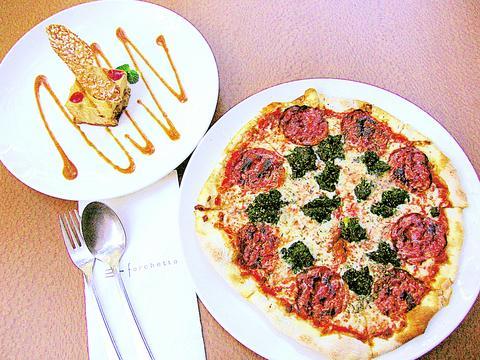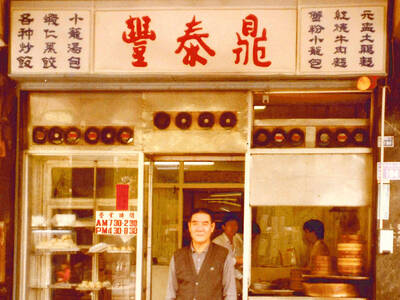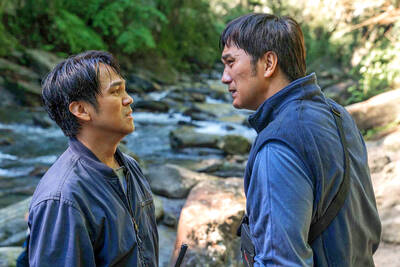Over the past six months, Max Tseng (
A veteran of the kitchens of Haoyang (

PHOTO: GAVIN PHIPPS, TAIPEI TIMES
And with the summer weather settling in, the simple and well-ventilated dinning area is a real treat. Max's design includes a huge glass facade, which, when fully open, gives the already spacious joint an even greater sense of space.
The dining environment is a major draw, but the food certainly cannot be ignored. A combination of Italian and Spanish with a bit of French, the dishes on the menu might not be as numerous as other European-styled joints, but for presentation and taste, Forchetta outclasses many, if not all, its rivals.
Forchetta's range of tapas include Spanish-style bread (NT$100), asparagus wrapped with Parma ham and Dijon pommary (NT$150), and roasted foie gras with fig sauce (NT$380). While a bit costlier than the average starter, Forchetta's Bufalo mozzarella with tomatoes (NT$360) is well worth the extra cost, especially when you consider that Max imports the cheese especially for this dish.
At present, Forchetta's pasta dishes are somewhat limited, with most of the half-dozen choices topped with seafood. These include linguini with crab and mushroom sauce (NT$260), penne with anchovies and olives (NT$260) and linguini with clam and white wine sauce (NT$260). According to Max, the pasta menu is set to change some time in the coming weeks when he plans to add new dishes to the pasta menu.
While the tapas and pasta dishes are faultless, it's Max's mouth-watering pizzas that have tongues wagging. The secret to Max's pizza is the crust. Not greasy, not soggy, and certainly not chewy.
Forchetta's pizza combinations include the absolutely fantastic spinach, salami, gorgonzola and mozzarella (NT$380) and the equally tasty, yet saucily spicy sausage, mushroom and mozzarella (NT$320). For cheese lovers, the gorgonzola, brie, ricotta and mozzarella (NT$380) comes highly recommended.
For those out to wine as well as dine, Forchetta offers a variety of both Old and New World wines, all of which are reasonably priced at between NT$700 and NT$1,500 as well as a good choice of bottled European beers at NT$170 a pop.

March 24 to March 30 When Yang Bing-yi (楊秉彝) needed a name for his new cooking oil shop in 1958, he first thought of honoring his previous employer, Heng Tai Fung (恆泰豐). The owner, Wang Yi-fu (王伊夫), had taken care of him over the previous 10 years, shortly after the native of Shanxi Province arrived in Taiwan in 1948 as a penniless 21 year old. His oil supplier was called Din Mei (鼎美), so he simply combined the names. Over the next decade, Yang and his wife Lai Pen-mei (賴盆妹) built up a booming business delivering oil to shops and

Indigenous Truku doctor Yuci (Bokeh Kosang), who resents his father for forcing him to learn their traditional way of life, clashes head to head in this film with his younger brother Siring (Umin Boya), who just wants to live off the land like his ancestors did. Hunter Brothers (獵人兄弟) opens with Yuci as the man of the hour as the village celebrates him getting into medical school, but then his father (Nolay Piho) wakes the brothers up in the middle of the night to go hunting. Siring is eager, but Yuci isn’t. Their mother (Ibix Buyang) begs her husband to let

The Taipei Times last week reported that the Control Yuan said it had been “left with no choice” but to ask the Constitutional Court to rule on the constitutionality of the central government budget, which left it without a budget. Lost in the outrage over the cuts to defense and to the Constitutional Court were the cuts to the Control Yuan, whose operating budget was slashed by 96 percent. It is unable even to pay its utility bills, and in the press conference it convened on the issue, said that its department directors were paying out of pocket for gasoline

On March 13 President William Lai (賴清德) gave a national security speech noting the 20th year since the passing of China’s Anti-Secession Law (反分裂國家法) in March 2005 that laid the legal groundwork for an invasion of Taiwan. That law, and other subsequent ones, are merely political theater created by the Chinese Communist Party (CCP) to have something to point to so they can claim “we have to do it, it is the law.” The president’s speech was somber and said: “By its actions, China already satisfies the definition of a ‘foreign hostile force’ as provided in the Anti-Infiltration Act, which unlike